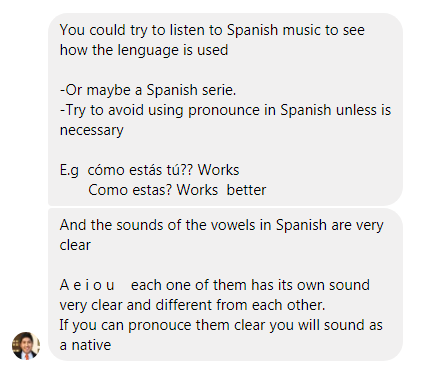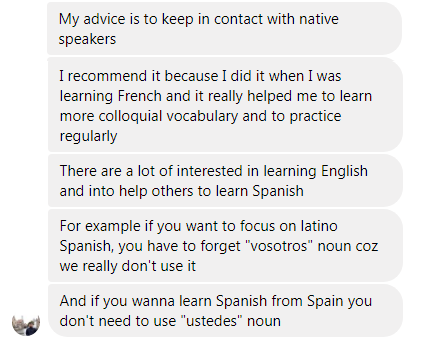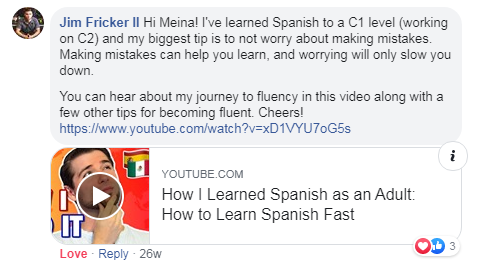
So, you finally decided to learn Spanish? Perhaps you’re still on the fence or you just want to see how before you jump in. Or maybe you’re already learning the language but something is missing with your progress. Whatever reason it is here you are.
In this post, you’re going to find 6 pieces of advice that I’ve personally asked from my language exchange partners who are native Spanish learning other languages, and 2 advice from Spanish learners. There’s one from a Spanish teacher, too.
I asked them this question.
If there is advice you'd like to give to those who want to learn or currently learning Spanish, what would it be? You know things like what should they pay attention to, things they should avoid, things they can expect, etc.
Let me start with my language exchange partners first. This is from Sebastian Jara Roa.

Spanish has subject pronouns, reflexive pronouns, direct and indirect object pronouns. They can be used to emphasize something if necessary. It might seem easy but can be a pain sometimes. So, knowing when to use and where to put them is important.
Next, it’s from Ana Paula Yañez. I’m not going to translate what she says into English. Let this be an exercise for you Spanish learners but you’ll get the idea.

This is one of the methods I use. I watch some telenovelas, listen to music, podcasts, and radio. The purpose is to get my ears familiar with the speech speed. I have to say the latter did baffle me at first because they speak so freaking fast.
In the end, I gave up trying to figure out what is it they are talking about. Yes, I got distracted from the main purpose a bit. But since I know a few words and by putting them together I do get the essence.
This one is from Jhoan Felipe Guerrero.

When I realized about me being a receptive learner, I tried my best to practice speaking with native speakers two or three times a week. If your main reason for learning Spanish is to speak fluently or to be able to hold conversations in that language then I suggest you better get started now.
Since I have many exchange partners from different countries such as Peru, Mexico, Argentina, Colombia, etc I do learn colloquial words. It’s interesting when I use words that I learn from one person and use it for another person they don’t understand.
So, they told me the words they use in their country. Having such partners fascinates me and now you can learn so much from them.
This is a fun video where they talk about Spanish accents from all over the world.
This is from @Nevermind_703 from Twitter.

My experience is the opposite of the above quote. Yes, this is the ‘you care too much’ case. When I was a newbie, I learned the grammar too soon. It overwhelmed me. Combined with a poor study plan led me to burnout.
I should have waited until I was somewhere at the intermediate level. The reason for that is usually when you’re on that level you probably already learn a bunch of common words and verbs.
By now, it would be a good time to start feeding your curiosity as to why the sentence forms that way and whatnot.
As for the Rs if you can’t roll your tongue it’s okay. If it makes you feel any better I’ve seen videos, where non-Spanish speakers speak Spanish fluently yet, can’t roll the R perfectly.
For the last 2 points, I think it happens with some Spanish speakers trying to speak English, too. That’s what some of my Spanish friends do. They love adding ‘and’ in their sentences more than they should.
This is from Fabián. My exchange friend from HelloPal. Apart from the main question I mentioned at the beginning I also asked him an extra question which is;
This is so true. For someone who’s been learning Spanish for years, this is nothing new. I have to say that all these were confusing to me at the beginning. I was like why on earth are there so many different accents, dialects, etc?
What I don’t realize is other languages are literally like that. Whenever I learn a new language I think of it as the only language out there. That’s why these facts didn’t register in my head early on. His conclusion hits me pretty hard for the second time.
The next one is from a Spanish teacher, SrtaMejia.

Back then, I did have bad habits in language learning. I chose the easier way out than facing it. For example, speaking. This skill is very difficult which is why I decided to just focus on listening. When I decided to try again, I was surprised.
I felt like something just got lifted off my shoulder. I was stress-free. It actually gave me confidence. Heck, even I’m always looking forward to doing it again.
Jim Fricker II also gave the same advice.

When I started with the Spanish language journey years ago I began to speak from day 1. I’m not worried about trivial things such as my accent, my grammar, what other people might think, etc because those can only get me so far. That’s what happened with my English journey.
People are more understanding than you think. They won’t mock you for your broken English or whatever your target language is. Even if there is just ignore them.
The irony is I did speak from day 1 but I chose to listen more because speaking requires you to think and I’m just lazy to do that.
The last one is from Joseph Trout from the Duolingo: Spanish/English Learners Facebook group.

Ser and estar are some of my weaknesses. It’s easy to remember them this way, ser is all things permanent while estar is the opposite. However, there are more rules involved and a few exceptions as well and that’s where you have to pay extra attention.
There’s one more piece of advice I want to add from my own experience. When choosing apps or websites to learn make sure they are teaching with the article el and la. It’s going to help you down the road when constructing sentences and understanding phrases.
If you happen to choose one that doesn’t it will leave you guessing the gender and that’s not the right way to live your life. With human beings and animals, it’s easy but the rest is a bit complicated.
Do you have your very own advice you’d like to share? Leave them below.
©2025 Together We Learn More
©2025 Together We Learn More
Trystn says:
Once again, great tips! Necesito practicar mas mi conversacion.
Meina says:
Hi, TieteWaller.
Thank you! Sin duda, practicar a hablar es un desafío. Quiero practicar más tambien pero mi mente just couldn’t keep up. Ahorita, solo voy con la corriente. I don’t want to force it too much 😀